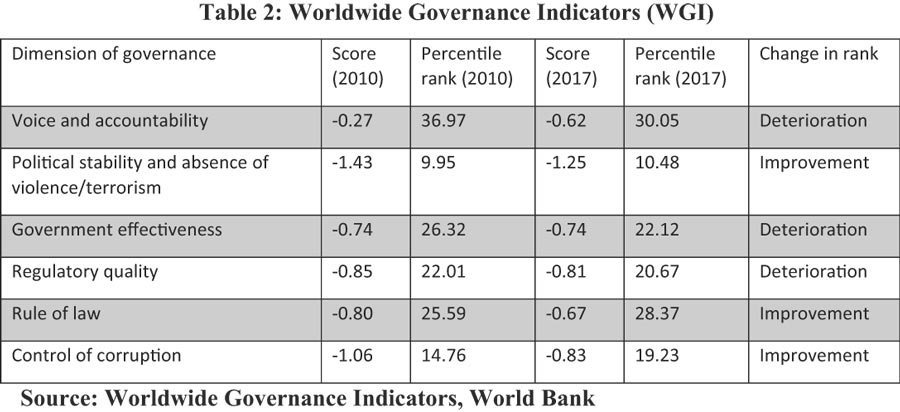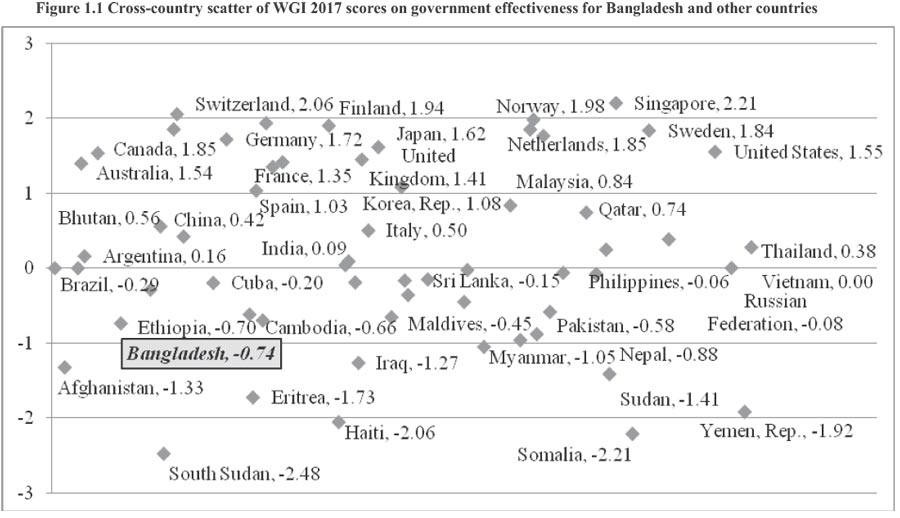Bangladesh's macroeconomic management has usually focused on the following goals which are quite similar to what was laid out in the Maastricht Criteria: (i) low and stable inflation (Bangladesh's monetary policy inflation target has been above global average but consistent with the country's economic parameters); (ii) low long-term interest rates (higher than global average but consistent with inflation target); (iii) low national debt relative to GDP (public debt to GDP ratio at 36.5 per cent in 2016 is in line with comparator countries); (iv) low deficits (the budget deficit as 4.7 per cent of GDP in 2016 is well within acceptable limit) and (v) currency stability (under managed float, the Bangladeshi Taka has been relatively stable for some time since Taka was floated in 2003). So budgeting and planning in the medium-term are in good shape, macroeconomic management is envy of neighbours but short-term problems cloud the medium and the long-term.
SHORT TO MEDIUM-TERM (FIVE YEAR) ECONOMIC PLANNING: Bangladesh fares well with comparable countries in terms of planning framework and link with budget but lags in synchronisation with budget and results achievement in which Korea is an outstanding example. Evidently, Bangladesh has some way to go in planning and learn from leading Asian countries like the Republic of Korea. When compared with other Asian countries--China, India, Indonesia, Philippines, Vietnam, Thailand and Malaysia--the first Perspective Plan of Bangladesh (PBB) (2010-2021) and Five-Year Plans of Bangladesh have strong link with the country's budget (Table 1). However, the results are weak to moderate despite that strong link.
The reason for Bangladesh's relatively weaker performance in this regard is the lack of synchronisation with the medium-term expenditure framework and the annual budget, especially in case of fiscal projection and implementation capacity of projects and programmes. The capacity of planning is overtaxed between the tasks of strategy formulation and policy development and sectoral planning, project planning, resource planning and evaluation.
In the short to medium-term up to 2030, two five-year plans will facilitate Bangladesh's achieving upper middle income country status by 2030. In the longer-term beyond 2031, the Planning Commission should consider focusing exclusively on vision, strategies and policies of both perspective and respective five-year plans, a path being followed by Niti Aayog, also known as National Institution for Transforming India. Currently, Plan realisation tends to lag behind targets. This is projected to change over Perspective Plan 2041. From the current 60-70 per cent realisation of projects and programmes, the achievement is expected to move up to 70 per cent by 2021, 80-90 per cent by 2030 and 90-100 per cent by 2041.





LONG-TERM ECONOMIC PLANNING: The Perspective Plan of 2021 placed strong emphasis on establishing a legacy of good governance by focusing on three fundamental principles of governance: (i) ensuring the rule of law; (ii) avoiding political partisanship; and (iii) building a society free from corruption. At the mid-point of the first Perspective Plan, the state of governance and economic management in Bangladesh presents a somewhat mixed picture, with some progress in modernisation of governance institutions, but signaling the need for corrective measures in many other critical institutions that foster development as the economy undergoes transformation-- first into an upper middle income country and then into a high income country.
The Perspective Plan 2021 included a strategy for improved governance, based on four key pillars: (i) strengthening the civil service; (ii) promoting devolution to local governments; (iii) strengthening Public-Private Partnerships (PPP); and (iv) reforming the processes of planning and budgeting. Attaining the milestones of Vision 2021, as articulated under the Perspective Plan of 2021, critically depends on addressing key governance challenges, namely: (i) deficiencies in the capacity of the public administration; (ii) shortcomings in economic management; and (iii) troubling malfeasance affecting performance across all segments of the public administration.
Are institutions weak in Bangladesh? Many would tend to say 'yes', but doubts persist. After all, the country is managing a population of 160 million that is growing without any major crisis or civil war. Therefore, the so-called 'Bangladesh surprise' is perhaps no surprise at all. Bangladesh did well on MDGs and is expected to do well on SDGs too despite relatively low per capita income simply because institutions are strong, governmental with gaps, non-governmental in a robust way and the people are the source of strength of in Bangladesh. Take the case of 'fertility decline' which has been lauded by all in awe. People made the rational choice to have smaller families. Economists consider challenges to address governance in Bangladesh which is lacking in strength, competency, effectiveness, transparency and accountability and struggling with the consequences of corruption. Governance is a metaphor for sound administration for sustainable inclusive development that lowers poverty and inequality.
RANKING BANGLADESH'S GOVERNANCE IN THE WORLD: The state of governance and economic management in Bangladesh presents a mixed picture calling for corrective measures going along with transformation into a developed country. Governance is often said to be holding back Bangladesh from fulfilling its full economic potential. This is reflected in the country's performance in the World Bank's Worldwide Governance Indicators (WGI) - the "aggregate and individual governance indicators for 215 countries and territories since 1996, for six dimensions of governance". In 2017 (the latest available data), Bangladesh fared as follows (Table 2):
Percentile rank refers to the percentage of countries that scored at par or below that particular country. It should be noted that the estimate scores of governance (Figures 1.1-1.2.) range from -2.50 to 2.50. The scores are classified as very weak (<-1.00), weak (-1.00 to 0.00), moderate (0.00 to 1.50), good (1.50 to 2.00) and very good (>2.00). As for government effectiveness, Bangladesh situation is assessed as in the 'weak' category (Table 2.). Within the next two decades it has to move to the category of 'good' or better which is the way most developed countries are characterised as.
The state of governance and economic management in Bangladesh at the mid-point of the Perspective Plan 2021 presents a mixed picture, with some progress in modernisation of governance institutions, and calling for corrective measures in many other critical institutions that foster development. There is ample room for moving up the ladder by the needed radical steps to turn the governance situation around, a phenomenon that will surely provide impetus to growth performance in the next decade and beyond.
CONCLUSION: Reform-minded government should seize opportunities to build consensus, address the obstacles to change, and initiate and sustain reforms to build an effective public sector. The resulting reinvigoration of public institutions will surely generate large payoffs. Good governance is the launch pad for longer term perspective development of Bangladesh. Democratisation is a process which can be slow, flawed, hybrid, full and pluralistic. Decentralisation of power is paramount to pluralistic democracy and good governance. Bangladesh cannot go forward and be a developed country by 2041 unless administrative, financial and political powers are decentralised to the lowest hierarchic level of government structure.
Capacity building for institutions compatible with a transforming economy is important for pluralistic democracy, decentralisation of power and good governance. The critical elements are: right type of institutions for right task, strengthening of institutions to function effectively in delivering assigned tasks, developing capacity to manage institutional transition during socio-economic transformation and finally, making sure that institutions remain dynamic-- not trapped in partisanship, mediocrity and conformity. Growth will be sustainable only if institutions are strong.
Reforming institutions is a must to start with for a new Bangladesh transiting towards a developed country as dreamt by our Prime Minister. A Cabinet of talents with her strong and visionary leadership would facilitate speedy transformation and transition.
Professor Shamsul Alam is Member (Senior Secretary), General Economics Division, Bangladesh Planning Commission. He has been the lead author of the First Perspective Plan of Bangladesh 2010-2021. [email protected]


